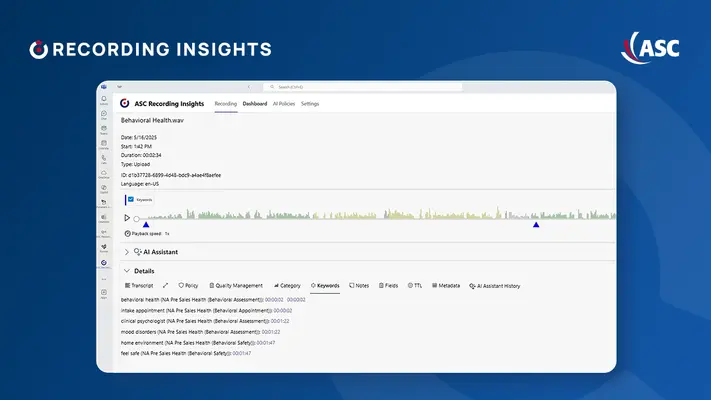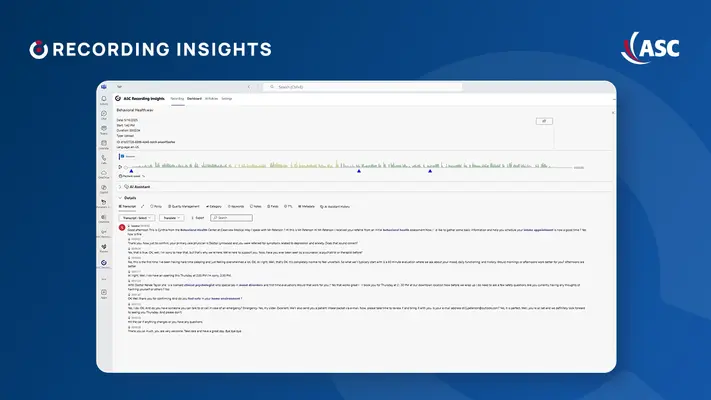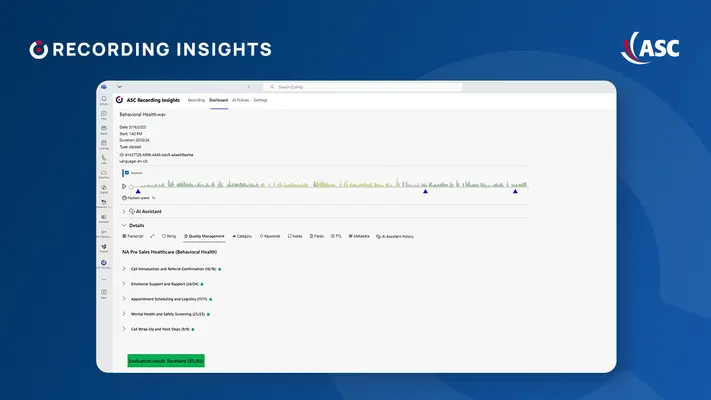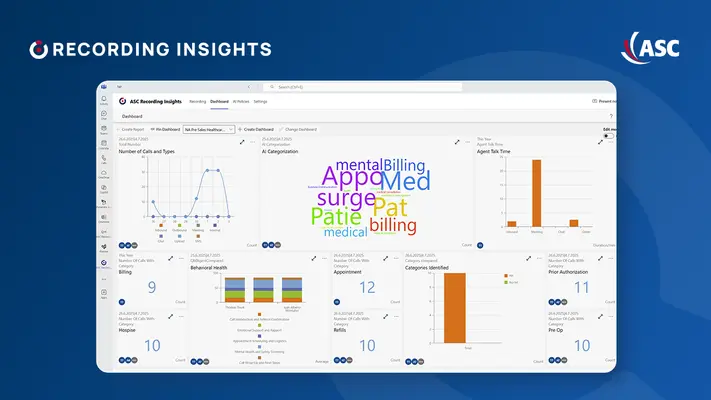Overview
Compliance, Artificial Intelligence, Healthcare
Why HIPAA Needs AI-Supported Compliance

The Health Insurance Portability and Accountability Act (HIPAA) defines strict standards for the handling, storing, and disclosing of medical data in the U.S. Medical institutions must ensure the confidentiality, integrity, and availability of Protected Health Information (PHI) across all communication channels.
Non-compliance isn’t just a technical issue — it’s also a legal and financial risk. Penalties for non-compliance can range from $100 to $10,000 per incident, with annual fines reaching exceeding $1.5 million. In severe cases, criminal charges and reputational damage may follow.
The growing complexity of digital communication in healthcare, including phone calls, chats, and video calls via unified communication platforms such as Microsoft Teams or Zoom, significantly increases the risk of errors. With more channels and interactions, as well as higher documentation requirements, it becomes more difficult for staff to consistently comply with all HIPAA regulations in real time. Even minor errors — such as missing consent statements or incorrectly storing files — can lead to serious consequences and constitute a HIPAA violation.
Meanwhile, regulated healthcare entities are expected to provide seamless access to electronic health records, ensure secure data handling, and maintain full control over the use of protected health information (PHI).
Many providers now use artificial intelligence technology to improve service quality and efficiency. HIPAA Compliance AI enables AI-powered transcription, detects compliance risks, and ensures the secure, audit-ready storage of communication data across all channels.
Use Cases: How AI in Healthcare Enhances HIPAA Compliance and Data Security
As organizations and their business associates and IT service providers process and manage larger volumes of digital communications and sensitive health data, the pressure to consistently comply with HIPAA and reliably protect health data increases.
Traditional manual processes are reaching their limits here, especially in telemedicine and with the growing use of cross-channel patient communication.
Whether telephone, video, chat or messaging - interaction with patients now takes place via a variety of channels. Omnichannel communication enables flexible and patient-oriented service but presents new challenges to service providers when implementing data protection and HIPAA requirements.
AI applications play a crucial role in this context. When implemented correctly, AI not only helps to prevent breaches of HIPAA requirements, but also improves service quality and supports the creation of secure and transparent workflows.
AI-Powered Detection of HIPAA Violations
HIPAA-compliant AI tools analyze recorded communications for missing disclosures, improper wording, and noncompliant advice. The system recognizes conversations that violate applicable guidelines, such as those involving no patient consent or unauthorized access to electronic health records.
These alerts can be reviewed in real time via dashboards during audits. Insurance companies and other institutions benefit from faster response times, less manual checking, and greater transparency in the handling of sensitive health data.
Structured Documentation and Audit Trails
AI assists with documentation by automatically marking and categorizing relevant conversation segments, then assigning them to the appropriate HIPAA guidelines. This also includes automatic timestamps, context classification, call indexing, and automated categorization according to relevance.
This high level of documentation facilitates the implementation of internal regulations, reduces the risk of missing evidence in the event of a breach and significantly improves the efficiency of external audits. Additionally, AI-supported workflows enable the timely storage and deletion of sensitive data, which is a key component of compliance with legal retention periods.
AI for Quality Management in Patient Communication
AI doesn’t just detect errors — it also helps healthcare providers improve communication. By analyzing the tone, structure, and clarity of the interactions, AI can evaluate whether key information was delivered appropriately and if patient concerns were addressed.
Supervisors and compliance teams use these insights to train staff, improve healthcare operations, and create consistent communication experiences that align with HIPAA standards.
Dashboards for Risk and Performance Insights
Modern AI platforms for the healthcare sector offer interactive dashboards with integrated AI data analytics that enable analysis of data by risk level, facility, communication channel, or compliance category.
This dashboards allow critical patterns to be recognized at an early stage and provide targeted support in identifying breaches. The platforms provide a complete overview of where HIPAA requirements are being met - and where deviations regularly occur. These insights facilitate strategic audit planning, efficient resource allocation and targeted training for teams working with sensitive healthcare data.
Using AI Responsibly: Protecting Patient Data and Privacy
As AI technology becomes more prevalent in healthcare, the need for clear accountability grows. Although AI offers significant efficiency gains and deeper insights, it must be implemented in a manner that safeguards patient privacy and supports existing regulatory frameworks.
The benefits of AI in healthcare — such as automated documentation, risk detection, and quality improvement — can only be realized if the underlying systems are designed with security, transparency, and fairness in mind. This includes setting clear boundaries for how healthcare data is processed, stored, and accessed.
A HIPAA-compliant AI solution must be built to meet defined security standards and actively support data privacy. This means the AI tool must allow for the following:
- A responsible compliance strategy requires limiting access to sensitive data and strictly avoiding using patient information to train AI models — thereby reducing the risk of data breaches.
- Transparency in how AI evaluates and flags patient conversations is key to responsible healthcare compliance.
- Minimizing unnecessary data use helps reduces the risk of compliance breaches and ensures greater control over sensitive patient information.
- Monitoring how decisions are made and reviewed by human compliance teams ensures that AI remains a supportive tool rather than an unchecked authority.
Effective AI governance ensures that systems are not only technically compliant, but also ethically sound. The ultimate goal is to use AI not just to automate — but to strengthen compliance, improve outcomes, and ensure that healthcare organizations can responsibly manage their digital transformation.
In addition to technical and ethical criteria, choosing the right technology partner is crucial. A HIPAA-compliant solution can only realize its full added value if the provider itself meets the highest security and trust standards. Healthcare organizations should therefore focus on certified providers with a proven experience in compliance recording - for example with SOC 2 attestation, ISO 27001 certification, and clear processes for auditing, access control and data protection management.
Equally important: a comprehensive Business Associate Agreement (BAA) that holds the Business Associate accountable and regulates specific measures for preventing and reporting data protection breaches.
A look at further regulations such as the HITECH Act, which defines the Breach Notification Rule and stricter requirements for business partners, among other things, shows how crucial the selection of a trustworthy provider is.
Checklist: Choosing a HIPAA-Compliant AI Solution
Not all AI tools are designed for regulated healthcare environments. To ensure that your investment truly supports patient data protection and operational transparency, your compliance team should look for the following features:
- Alignment with the HIPAA Privacy Rule and HIPAA Security Rule – including access control, encryption, consent workflows, and audit readiness
- Role-based access controls and documentation of all activity within a centralized compliance platform
- Real-time alerts, policy hits, and transparent logic to enable compliance automation
- A scalable solution that supports all communication channels — voice, video, chat, and screen
- Business Associate Agreement (BAA) and legal safeguards for healthcare-specific risks
- Dashboards and KPIs for risk trends, policy violations, and communication quality
A truly HIPAA-compliant AI tool should do more than just detect — it must actively support decision-making, provide clarity for audits, and integrate seamlessly with your broader compliance software ecosystem.
That’s exactly what ASC offers with Recording Insights and Neo Suite: scalable, secure AI solutions for healthcare communication — built to protect sensitive data, meet privacy rules, and strengthen your compliance processes long term.
Disclaimer
Please note that we do not provide legal advice and that this information cannot replace legal review or consultation.







